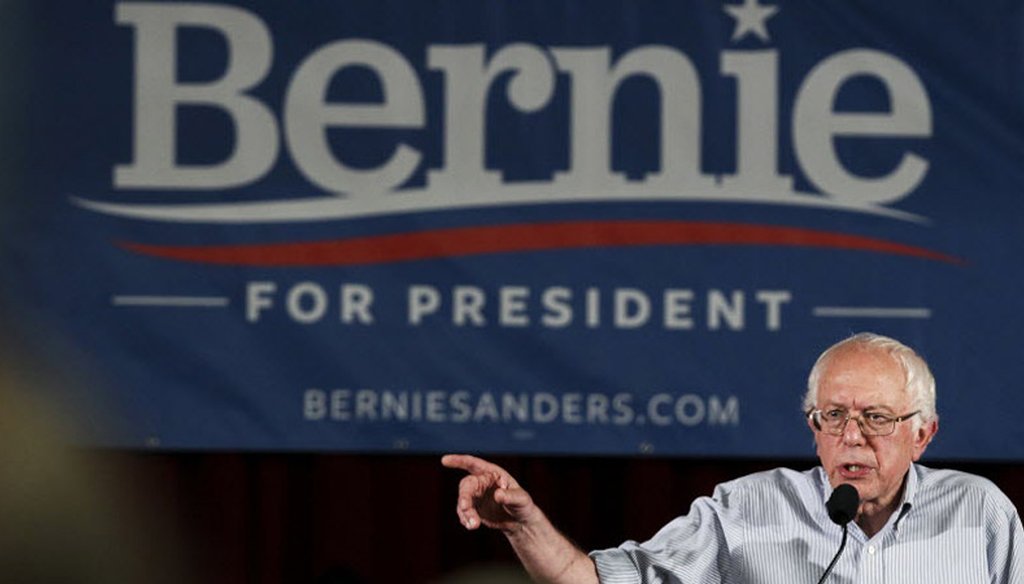

Our only agenda is to publish the truth so you can be an informed participant in democracy.
We need your help.


Bernie Sanders in Salem, N.H. Aug. 23
U.S. Sen. Bernie Sanders, the independent from Vermont, is trying to attract black voters to his presidential campaign, despite some opposition from activists in the Black Lives Matter movement.
The website for Sanders’ campaign for the Democratic nomination devotes an entire section to "Racial Justice." It kicks off by reciting the names of Michael Brown, Eric Garner and other individuals who have died during encounters with police.
"We know their names," it says. "Each of them died unarmed at the hands of police officers or in police custody… We should not fool ourselves into thinking that this violence only affects those whose names have appeared on TV or in the newspaper."
Then it says this: "African Americans are twice as likely to be arrested and almost four times as likely to experience the use of force during encounters with the police."
Further into Sanders’ presentation, the policy statement repeats the same two points. Only this time, these points closely follow some other statistics about blacks being three times as likely to be searched during a traffic stop, a statistic attributed to a U.S. Bureau of Justice Statistics report.
We wondered where Sanders had gotten his information about blacks being twice as likely to be arrested and being almost four times as likely to experience police force.
Sanders’ policy advisor, Warren Gunnels, initially referred us to a 2007 U.S. Bureau of Justice Statistics report based on 10-year-old data from 2005.
He directed us to the first page, where the federal statisticians had reported that "...black drivers were twice as likely as white drivers to be arrested." This didn’t support the statement that African Americans are twice as likely to be arrested in all cases for all arrests.
The report did make a convincing presentation on another page showing that in 4.4 percent of their contacts with police, blacks experienced a use of force in 2005, while whites experienced force in only 1.2 percent of their contacts with police.
This did support Sanders’ statement that African Americans are almost four times as likely to experience the use of force during encounters with police. In 2011, the federal statisticians revisited the same issue, examining 2008 statistics.
They found that blacks experienced a use of force in 3.4 percent of their contacts with police. The percentage for the whites was still 1.2 percent. So the updated statistics show blacks being just shy of three times as likely — not almost four times as likely — to experience force during an arrest.
Is there also more current data on the first part of Sanders’ claim? We got back to Gunnels to follow up on the likelihood of arrest question.
Gunnels directed us to a report compiled by The Sentencing Project, a Washington D.C.-based organization that promotes alternatives to imprisonment and also carries out research on criminal justice issues, including racial disparities.
A passage in that 2008 report asserted that blacks are arrested at a rate twice their share of the population. Marc Mauer, The Sentencing Project’s director, provided additional analysis based on 2013 arrest statistics from the FBI Uniform Crime Report and data from the U.S. Census.
In 2013, blacks represented 28.3 percent of all persons arrested, even though they were only about 13.2 percent of the national population, Mauer said, noting that the 13.2 percent population figure is an estimate that tends to fluctuate.
"If all things were equal, you would expect blacks to represent 13.2 percent of all arrests," Mauer said. "But they are not equal. The 28 percent figure is a little more than double the national population figure."
By contrast, whites represented about 77.7 percent of the population in 2013, Mauer said, and whites represented about 68.9 percent of all arrests.
Does this mean blacks are twice as likely to be arrested as whites?
"They are arrested at twice their share of the population," Mauer said. And yes, he said, this also means blacks are twice as likely to be arrested as whites.
Our ruling
Blacks are twice as likely to be arrested as whites based on a criminologist’s analysis of the 2013 data.
But, based on the latest numbers that the federal statisticians could provide regarding use of force, blacks are about three times as likely to experience force during encounters with police.
Three times is not "almost four times," but Sanders was 75 percent correct, which is more than a passing score and the rate was close to four times in an older study.
For this reason, we rate the statement Mostly True.
BernieSanders.com, "Bernie Sanders On Racism and Racial Justice," accessed Aug. 18, 2015
Email from Warren Gunnels, senior policy advisor for U.S. Sen. Bernie Sanders, Aug 18, and Aug. 20, 2015
Interview Warren Gunnels, Aug. 19, 2015
U.S. Bureau of Justice Statistics, "Contacts between police and the public, 2005," April 2007, accessed Aug. 19, 2015
U.S. Bureau of Justice Statistics, "Contacts between police and the public, 2008" October 2011, accessed Aug. 26, 2015
Email Adoratia T. Purdy, spokeswoman U.S. Bureau of Justice Statistics, Aug. 26, 2015
Sentencingproject.org, "Reducing Racial Disparity in the Criminal Justice System," 2008, accessed Aug. 20, 2015
Interview Marc Mauer, executive director, The Sentencing Project, Aug. 24, 2015
In a world of wild talk and fake news, help us stand up for the facts.
